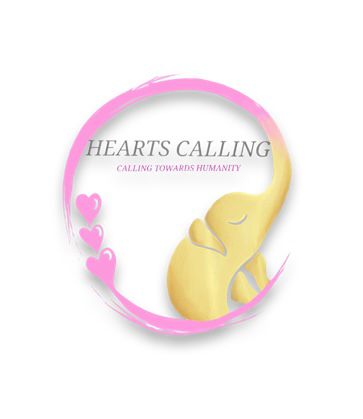Wanna peak into how we actually run our Educational program? Then read this.

Wanna peak into how we actually run our Educational program? Then read this.
While you are reading this text, you are probably on our website wondering: How does Heart`s Calling does all the work? How do we actually run our Educational programs? What are secrets behind our work? How do we manage to achieve all of this?
Well, if that is the case, you are lucky. I had an opportunity to interview Sutirtha Roy, one of our Educational team volunteers. She shared with us what is it like to work at Heart’s Calling, what’s her role, experience and many more.
She also gave us some advice for aspiring changemakers and educators, who want to pursue a career in the education.
Read on to discover her educational credentials that made her want to join the Heart's Calling!
The interview:
Q: What is your role on the Heart's Calling Education Team?
A: At Heart's Calling, I am deeply committed to nurturing the emotional well-being and educational development of children in orphanages across India. To achieve this, I have designed comprehensive lesson plans centered around social emotional learning. These plans are tailored to address the unique needs and circumstances of each child, providing them with valuable skills to navigate life's challenges with confidence and resilience. As part of the ongoing efforts to extend my support, I have identified several orphanages in India that I believe could benefit immensely from our programs.
Q: What are your educational credentials or experiences that made you want to join the Heart's Calling Education Team?
A: Educational Qualification: Masters in Zoology with specialization in Biodiversity and Ecosystem Functioning. Experiences: I have worked with the United Nations - One Planet Network as a Sustainable Lifestyles and Education Contributor and Researcher. Currently, I am a Teach for India fellow. These experiences in the educational field have made me want to join the Heart’s Calling Team so that I can work to provide quality and sustainable education to the future changemakers.
Q: Why do you believe education regarding homelessness, poverty, and orphans is so important?
A: Education on these topics helps break down stereotypes and misconceptions. It allows individuals to gain a deeper understanding of the challenges faced by those experiencing homelessness, poverty, or orphan hood. Education empowers individuals to become advocates for social change. When people are informed about these issues, they are more likely to actively participate in efforts to address them, whether through volunteering, supporting policy changes, or advocating for better resources. Education is a powerful tool in breaking the cycle of poverty and homelessness. Access to education is a fundamental human right. By providing education on homelessness, poverty, and orphan hood, societies affirm the dignity and rights of all individuals, irrespective of their socio-economic status. Education is directly linked to several Sustainable Development Goals (SDGs). It is critical in achieving Goal 1 (No Poverty), Goal 4 (Quality Education), Goal 10 (Reduced Inequalities), and Goal 11 (Sustainable Cities and Communities).
Q: What role has education played in your life?
A: Education has played a pivotal role in shaping the person I am today and has had a profound impact on various aspects of my life. First and foremost, education has been instrumental in fostering my passion for advocacy. Through learning about global issues, I became an advocate for the United Nations, championing their initiatives for a more just and sustainable world. This advocacy work has allowed me to contribute to meaningful causes and be part of a larger movement for positive change. Moreover, education has been the cornerstone of my personal and professional development. It has equipped me with the knowledge and skills needed to pursue my dreams and aspirations. Through a rigorous academic journey, I have been able to set and achieve both long-term and short-term goals. This has instilled in me a sense of discipline, determination, and a strong work ethic. Education has also been the catalyst for developing compassion and empathy within me. It provided me with opportunities to learn about diverse cultures, perspectives, and experiences. This understanding has allowed me to connect with people on a deeper level and to approach challenges with a compassionate and inclusive mindset. It has not only enriched my mind but also enriched my character, enabling me to contribute positively to society and work towards a better future for all.
Q: What has been your experience educating with Hearts Calling?
A: It has been a truly enriching experience working with the education team at Heart's Calling. As the project is currently in its preliminary stage, we have focused on developing comprehensive lesson plans. We eagerly await the moment when we can finalize collaborations with the orphanages and begin implementing these plans in action.
Q: Why do you believe the operations of education from the Hearts Calling organization is so important?
A: I firmly believe that the operations of education within the Hearts Calling organization are of paramount importance. Education stands as the cornerstone of Hearts Calling's mission, and for good reason. It serves as the primary avenue through which we can effect positive and transformative change in the lives of the children residing in orphanages. Education is not merely a facet of our work; it is the main branch, the foundational pillar upon which we build brighter futures. By providing these children with access to quality education, we equip them with the tools, knowledge, and skills necessary to break free from the cycle of adversity and shape their own destinies. Through education, we instill a sense of empowerment, self-worth, and aspiration within each child. It offers them a pathway to discover their unique strengths, interests, and potentials. Furthermore, education cultivates critical thinking, problem-solving abilities, and a broader understanding of the world, enabling them to navigate life's challenges with resilience and confidence.
Written for Hearts` Calling by Pavle Đurakić
866
Written by Pavle
